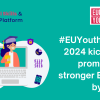Youth Work HD - Lithuania
The Youth Work HD online platform is the child of a partnership between several European countries with the common objective of supporting young people's professional development in several EU Member States. The online platform provides a range of resources suitable for those working with young people - youth centre workers, carers helping young people with special needs, or trainers in educational centres mainly working with youngsters. This means they can boost their knowledge of key issues and improve their skills in a way to make their daily work (and lives) easier, and increase the learning outcomes of their students.
A learning platform for youth workers in 4 countries
Behind the platform (and project) is a consortium of partners, comprising of the Rijeka Technical Cultural Centre in Croatia, the association “Langas į ateitį" ("Window to the Future") in Lithuania, the Latvian Information and Communication Technology Association (LIKTA) and the European Grants International Academy in Italy. The key objective of all partners was to develop an online learning platform that makes it possible for young workers to get the knowledge and skills they need to access quality jobs in the labour market; build an environment where stakeholders and key digital actors in Europe can collaborate, communicate and cooperate; and improve overall understanding of young people's needs, and challenges ahead.
Resources and materials, as well as the training course developed over the course of the project and launched in 2018, are available in 5 languages: English, Lithuanian, Italian, Croatian, and Latvian. Educational materials and resources cover a range of topics, including e-journalism, web design, online collaboration tools, basic HTML coding, video editing, mobile application design and maintenance, and community radio. Each module lasts 15 hours and consists of mandatory and optional tasks, interactive lessons, infographics, videos, advice from youth work experts and a final test. Upon successful completion of a module, course participants receive a certificate to credit their achievement.
Supporting youth workers in Lithuania
The learning materials of the project partners in the Youth Work HD learning system have been developed based on the results of studies on the needs of youth workers carried out in early 2017. Studies involving more than 500 youth workers in Lithuania highlighted the need to develop skills and learn about the use of ICT tools for youth work. Based on this feedback, distance learning courses and training modules were developed as the project progressed, and taking into account lessons learnt specifically within the Lithuanian context.
Key competences for those working with young people
Focus groups ran in Lithuania helped to highlight key competences needed to reach out to young people and engage them, one challenge identified by those working with young people on a daily basis. Participants pointed to several essential skillsets needed, including 1) the ability to properly analyse young people's needs, elaborating individual mentoring and coaching plans; 2) communication and social skills, including the knowledge to promote youth activities via social media and other digital channels, emotional intelligence, and social sensitivity, especially in the case of students from low socio-economic or otherwise marginalised backgrounds; and 3) sound project management and organisational skills, problem-solving attitude and a creative mindset to tackling challenges.
To best train youth workers, focus group participants pointed to the need for public and private blended courses, which are considered most effective. Online training allows for additional flexibility and may be useful for rural youth workers, or those living far away from the youth training centres they conduct activities in. Face-to-face lessons, on the other hand, help to tackle problems in real-time, and ensure direct communication between all participants in the learning course.
The full results of the study that informed the training course for youth workers in Lithuania can be read in English here. Based on the results of the studies in Lithuania, distance courses and modules on a range of topics were developed. These included:
- Communication with young people;
- Interaction with organisations
- Interaction with social partners
- Political influence on youth work
- Use of digital tools and digital applications.
Digital tools to make youth workers' lives and work easier: concrete project outputs
The 'Digital tools and applications' module in the training course aimed at youth workers and educators compiles a list of skillsets and digital tools to boost the performance of young people in the classroom, and outside. In this module, youth workers can learn more about online planning and project management tools, such as calendars, Doodle, practical online project management systems, Trello and others. They can also improve their ability to schedule and run online meetings, saving time and resources for all - what channels to use, what online tools (Skype, WhatsApp), and find tips to stay safe online. Other tools covered by the module include resources to collect opinion and feedback online by using surveys, testing out how to create and design survey questions, using software like Google Forms. Digital data imaging and social media tools are two other areas included in the digital module for youth workers.
The module ends with the knowledge and skills test.
The project tested more than 130 youth workers from European countries. They address themes of communication with young people, cooperation with stakeholders, the impact of youth policy on the activities of youth workers and the increased involvement of young people through the use of ICT tools.




